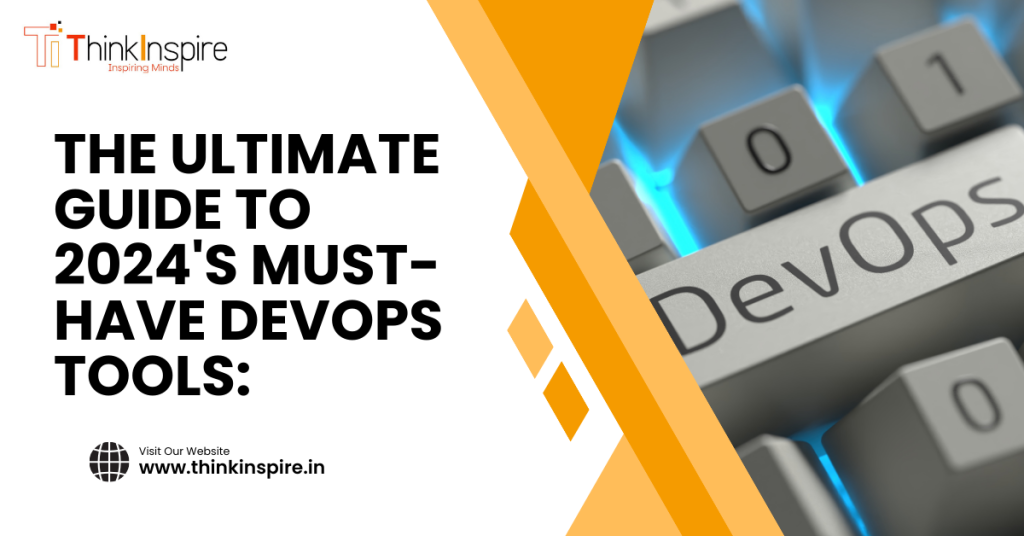
Table of Contents
Introduction: The Concept of DevOps Tools and Its Related Tools Satisfying Evolved Requirements
In the software development sphere, the world continues to evolve, and DevOps, which is an evolutionary trend of thought, is the long-standing gap between development and operations triggered by a paradigm shift. Through this momentum shift which stresses elements like teamwork, automation and improved communication, the time-to-market is reduced while product quality is enhanced and the number of failures is minimized.
The Cornerstones of DevOps: The Top DevOps Tools Every Developer Needs To Master in 2024
Git:
Git has been at the root of software development since the start of DevOps, empowering agile version control, teamwork in coding, and management of projects. Git brings the advantage of its distributed architecture along, in remote work where / it allows for smooth collaboration of offline working developers or tracking of code modifications by any programmer.
Maven:
Maven has been an essential part of dependency management, project build, and project issuing JAVA-based development and providing consistent, reproducible processes. It is clear that its role in the seamless integration and deployment has not changed at all, and is therefore still the basis for developers’ software delivery process.
Jenkins:
Among automation servers, Jenkins stands out by contributing to the establishment of CI/CD pipelines, which are a part of a continuous integration and continuous delivery (CI/CD) cycle. What’s very exciting about this technology is its excellent flexibility, extensibility that accommodates more technologies and amazing library of plugins. This is the reason why software delivery through this method is the fastest.
Chef and Puppet:
Chef and Puppet help companies automate the provisioning and maintaining of servers and employee security, and their processes ensure that such server infrastructure is scalable and reliable. Such solutions seamlessly integrate with different cloud providers’ and containers’ technologies, which makes this architecture scalable and provisional on the fly.
Docker and Kubernetes:
Docker eases the foundation of app management across different environments by involving the encapsulation of the apps and their dependencies within containers. Contrary to Kubernetes, however, orchestrates and controls the lifecycle and performance of distributed applications on a large scale, offering the ability to recover from failures and has self-healing capabilities that are highly essential for modern DevOps.
Ansible:
The ease of use and the extensibility of Ansible define the popularity of this tool among system administrators to automate manual actions, set up infrastructures, and keep configurations in control over diverse computing systems. One of the key features of ModernRun is its agentless architecture and a wide set of available prebuilt modules, which makes this platform easy to implement for beginners and professionals on the same level.
AWS, Azure, and GCP:
Cloud Computing and Storage Solutions: With the rise of cloud computing, organizations can now access vast amounts of storage and computational power that were previously unattainable.
Multiple cloud providers such as AWS, Azure, and GCP support the core pillars for DevOps adoption; which are scalability, flexibility, and low cost. Now, these platforms are able to deliver plenty of different services: computation, databases, container orchestration and serverless computing, so they dance just to the rhythm of software development and delivery.
Monitoring, Alerting, and Incident Response Tools: DevOps Tools
Monitoring, Alerting, and Incident Response Tools are Also Part of Security Operations Governance to ensure that an organization has the capabilities to detect and respond to cyber-attacks.
As part of this process, the SignalFx, AppDynamics, and Raygun tools serve their part, monitoring, alerting, and following up on incidents, hence ensuring application reliability, performance and security. These tools, in turn, allow system health inquiries to be as good as real-time, hence permitting the proactive detection of issues before they occur by users. In the end, these interventions mainly improve user experience and the system’s health baseline.
Learn from ThinkInspire:
In this age of revelation and revolution, Why would you not Look for Knowledge and embrace innovation? It is what we do: At ThinkInspire we offer the brand to emphasize instructor-led courses with customer training in the advanced use of the latest equipment and methods so that you can drive innovation and efficiency in your company. Let’s at once engage and guide you to ever-greater DevOps achievements!
Conclusion: DevOps Tools
This guide presents the essentials of DevOps tools used to achieve the integration, automation, and continuous improvement strives of the software development process and operation. From merely having a control version with git to employing complex systems with Kubernetes, in order to remain adaptable in a highly dynamic DevOps workflow, these tools must be mastered.
With proper training and a set of tools, enterprises can gobism up the process of DevOps which will deliver software faster, more reliably, and with the highest quality compared to the traditional approach. Cultivate the DevOps emerging role and open up new opportunities in the creation and development of the Agile Methodology in 2024 and the following years.
FAQs
What role does Jenkins play in the DevOps environment?
Indeed, Jenkins automates CI/CD processes via tools also known as the DevOps which are Jenkins.
In incorporating DevOps tools, what possible problems organizations may have, would they be?
Issues like cultural resistance, insufficient human resources, and even dealing with complicated operational legacy systems spring up. A concrete playbook and implementation with necessary training are central pieces to operation success.
What is the best way for the DevOps tools to work with the previous systems?
Of course, DevOps tools have an interface that blends smoothly with the existing systems, thus the results are always neat and effective.
Start your DevOps journey with ThinkInspire and transform your software development and operations today!
1 Comment.